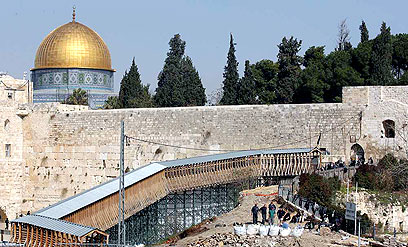&91;3&93;_a.jpg)
PM delays discussion on Temple Mount project
Ynet learns Netanyahu canceled at last minute decisive discussion aimed at setting a date for start of construction of new Mugrabi Gate in Jerusalem. Security sources express their fear of violent outbreak on eve of Ramadan fast
The official explanation given for the delay was a stormy discussion at the Knesset on Wednesday, in which the Coalition was humiliated. However, security sources have expressed their fear that making such a decision on the eve of the Ramadan fast would set Jerusalem on fire and spark another international row, in addition to the dispute over the construction of a hotel in the east Jerusalem neighborhood of Sheikh Jarrah.
The Muslims' fear of the new bridge stems from the possibility of bringing major forces onto the Temple Mount. "You are planning to bring armored personnel carriers to al-Aqsa through this bridge," a senior Muslim official recently told his Israeli colleague during an international conference in Europe.
"No," the Israeli responded. "We want this bridge to hold 300 police officers, in case of riots on the mount or an attack on Jewish worshippers at the Western Wall plaza."
A senior state official involved in the matter says that the discussion on this issue has been going on for five years.
"The matter was presented in full transparency to any interested elements, including UNESCO and the Jordanian. We are constantly holding talks with Jordan in a bid to reach understandings.
"The goal of the discussion in this forum was to renovate the bridge over the dike which collapsed, without hurting the public feelings involved – and nothing more. The decision on when to start building the new bridge is in the hands of the Jerusalem Municipality by law. This date has yet to be set, as it is a long and open procedure in any case," the official explained.

Mugrabi Gate area (Archive photo: Haim Zach)
The current sensitive situation began on February 14, 2004, when the dike under the old wooden bridge collapsed, and fears were raised that entering the Temple Mount would be dangerous. Experts, including then-Jerusalem City Engineer Uri Shitrit, ruled against climbing the dike for safety reasons.
According to the engineer of the Western Wall Heritage Foundation, the winter rains have worsened the dike's condition, and it now endangers the temporary wooden bridge and the worshippers praying at the women's gallery in the Western Wall.
Following rescue excavations which enraged Muslims, who launched a violent protest and led to the arrival of a Turkish delegation of monitors, a decision was made to build a permanent bridge which would be coordinated with all parties involved in the matter – Israel, Jordan, the Palestinian Authority and the Waqf.
The prime minister, who is leading this issue together with Intelligence Minister Dan Meridor, has been required to advance a decision on the matter. A preliminary discussion was held several days ago by professional elements, including representatives of the Prime Minister's Office, the attorney general, the Shin Bet, the Mossad, the Public Security Ministry and the police, the Jerusalem Municipality and the National Security Council.
Pressure and timing
A summarizing discussion was scheduled to be held at the Prime Minister's Office on Wednesday in order to make the decision, following a demand by security officials, who wish to maintain their ability to intervene in potential Temple Mount riots.
But on Wednesday, several hours before the discussion, Netanyahu decided to postpone it. His motives for doing so included the Muslim world's object to the new bridge project, due to fears that it would allow the entry of Israeli fighting forces and damage their holy site.
In addition, security sources – including Internal Security Minister Yitzhak Aharonovitch, recommended to Netanyahu to avoid making a decision on the start of construction of a bridge charged with religious emotions so soon before the Ramadan fast, which will begin in about a month.
Ministers Meridor, Aharonovitch, Moshe Yaalon, Eli Yishai and Yacov Margi were informed Wednesday that the discussion would be postponed due to the stormy discussion at the Knesset, but a new date for a meeting was not provided.
According to estimates, the prime minister will convene a meeting following the Ramadan month and after the current dispute with the United States over the construction in east Jerusalem fades away.
Another dispute between the Muslim world and Israel is over the Jewish state's plan to expand the Western Wall plaza, taking advantage of the space created under the bridge, after a plan to use this area in order to expand the women's gallery was rejected.
The Muslims, who base their claims on disputed archaeological findings, say that the al-Buraq Mosque is located under this area. From this place, according to Muslim tradition, Prophet Muhammad's horse ascended to heaven.
The caution and fear of a violent outbreak is based on past experience. During Netanyahu's first term as prime minister, he made a decision to open the Western Wall tunnel contrary to the opinion of security officials.
The opening of the tunnel on September 1996, which he referred to as "the rock of our existence", led to violent clashes between the Palestinian police and Israel Defense Forces soldiers in the West Bank and Gaza. Fifteen Israelis and dozens of Palestinians were killed in these events.










